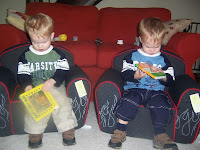 When it comes to children’s reading skills, nurture trumps nature. As it turns out, with proper instruction, children can improve dramatically in their reading development. So says a recent study out of Ohio State University.
When it comes to children’s reading skills, nurture trumps nature. As it turns out, with proper instruction, children can improve dramatically in their reading development. So says a recent study out of Ohio State University.
The study looked 135 identical twins and 179 same-sex fraternal twins who were enrolled in kindergarten or 1st grade, and reading skills were assessed for two years. The researchers compared how the twins scored on reading tests and then used a statistical analysis to determine how much genetics and environment influenced their progress. Environmental factors included instruction in school, nutrition, how much the children were read to, and how they were cared for by their parents.
A lthough genetics were found to be more important in reading speed, skills like learning letters and vocabulary, as well as awareness of sounds were all vastly dependent on the learning environment. The importance of this study is it shows that regardless of the level of reading a child enters school with, they can learn to read effectively with the proper instruction.
lthough genetics were found to be more important in reading speed, skills like learning letters and vocabulary, as well as awareness of sounds were all vastly dependent on the learning environment. The importance of this study is it shows that regardless of the level of reading a child enters school with, they can learn to read effectively with the proper instruction.
Uh oh, teachers–the onus is on you. No excuses. The practice of having separate tables for “smart,” “average,” and “slow” kids, I hope, is a thing of the past (that’s how my childhood classrooms were set up). If the practice is still alive, kill it now. Most level-headed people understand that all children are teachable. They may have different processing pathways, which require different strategies, but ultimately the instructors have to find what works. Period.
 And parents are responsible, too. Time for my high-horse again: If you are feeding your child soft drinks, sugary cereals, pop tarts, cookies, chips, candy…on a regular basis. Wake up! You are poisoning the poor kids.
And parents are responsible, too. Time for my high-horse again: If you are feeding your child soft drinks, sugary cereals, pop tarts, cookies, chips, candy…on a regular basis. Wake up! You are poisoning the poor kids.
And parents who don’t read breed children that don’t read. If you are watching oodles of T.V., guess who else is doing the same? Duh!
Finally, spending time and giving attention to your kids matters. Just being in the room with them while watching Oprah is not enough, you’ve actually got to interact with the buggers. Pick up a crayon, sing a song, bounce around…jump up, jump up and get down. And read a freakin’ book to them why don’t cha…give ’em a chance; otherwise, you leave it in teachers’ hands.












